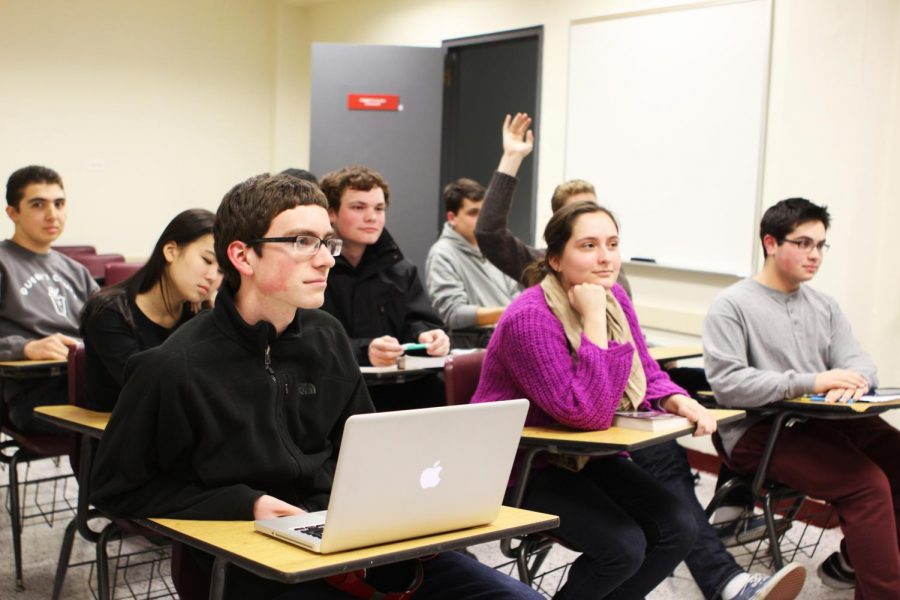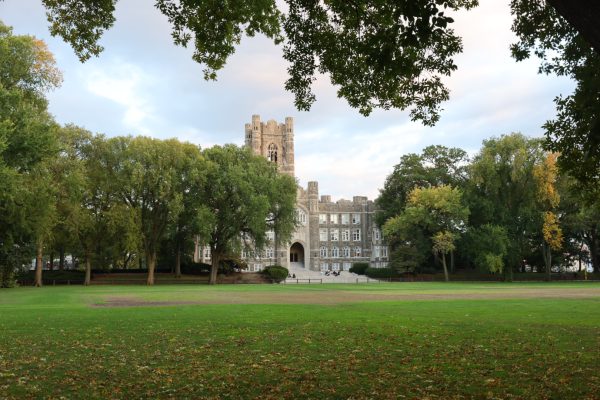Institute of American Language and Culture Revises ESL Curriculum
There are now 11 courses organized according to the Common European Framework of Reference.
Fordham University’s Institute of American Language and Culture (IALC) program, which provides language and culture, literacy and English as a Second Language (ESL) classes for adults, has revised its curriculum over the past three years to include interdisciplinary project-based courses.
These courses are made to help develop intercultural skills that align with international language proficiency standards such as the Common European Framework of Reference, according to James Stabler-Havener, director of IALC.
Stabler-Havener said the program is rooted in the belief that multilingualism is a gift and a skill that helps students both in and out of the classroom.
“It takes time and effort, but the ability to communicate in multiple languages opens many doors in the mind and in the world,” he said. “In many parts of the USA, if someone has limited English proficiency, it can be an obstacle in her [or] his career and personal life.”
According to the university’s website, fall course offerings for the Intensive English Program include varying levels of reading, writing, listening, speaking and grammar classes and electives, such as Presentations & Public Speaking, a course intended to sharpen students’ pronunciation and grammar skills in order to enhance their confidence using English. The revisions are met with increased emphasis on written response papers and in-class presentations.
The 11 courses are organized according to the Common European Framework of Reference, an international standard for describing language ability. Launched in 2001, the scale organizes language proficiency into six levels, (A1, A2, B1, B2, C1, C2) with A1 for beginners and C2 for those who have mastered the language. The courses can be further grouped into three broad levels: Basic User, Independent User and Proficient User.
An adult ESL/literacy class might have a unit focusing on medical care: making appointments, filling out hospital forms, describing symptoms and discovering information about healthcare resources, according to Stabler-Havener. Undergraduate courses may require students to research different cultures in New York City and then write a well-organized, grammatically correct essay to report their findings.
According to Stabler-Havener, the program’s members are working with individuals whose first language is not English to help alleviate linguistic and cultural challenges.
“I know experienced professionals — psychologists, nurses and doctors, engineers, etc. — who are not able to practice their profession because of their English proficiency,” he said. “There are also many recent immigrants and refugees who have come to NYC to pursue a better life for their families. We want to work with all of our students to develop the skills to remove those obstacles.”
The IALC program also created an online database of organizations that provide different social services for ESL students to use, according to Jorge Martinez, FCRH ’21, former administrative assistant for the program.
“Say, for instance, that one of them needed legal aid because of their immigration status, then they could use the database,” said Martinez.
The program also offers academic workshops for grammar and workshops dedicated to preparation for the Test of English as a Foreign Language (TOEFL).
Stabler-Havener said that for students, difficulty often lies in finding the correct English words to articulate their thoughts.
“It is a thrilling and humbling experience,” he said. “We believe it is critical that our courses review and introduce students to academic language, styles and rules they will encounter across various disciplines — sociology, business, history, etc. This means that a language course must relate to the broader themes students will encounter in their future studies.”
Maria Guzman, former student in the ESL/IALC program, said that she and her husband knew they had a big responsibility to raise their children in the best possible way — by reminding them that “school [is] a priority.”
“It is hard to live in this country with a big family like ours, especially if you live in an expensive city as New York. Also, being an immigrant with limited education can make it more difficult,” said Guzman. “Achievements are part of life, but you don’t get them just because you are lucky, you must work hard. ‘It is not easy, but it is not impossible,’ as the saying goes.”
According to Guzman, through teamwork, including the financial support of her husband and the help of her children at home, she was able to prioritize her education in the IALC program.
“Everything can be possible if you work hard and never give your dreams up.”











































































































































































































